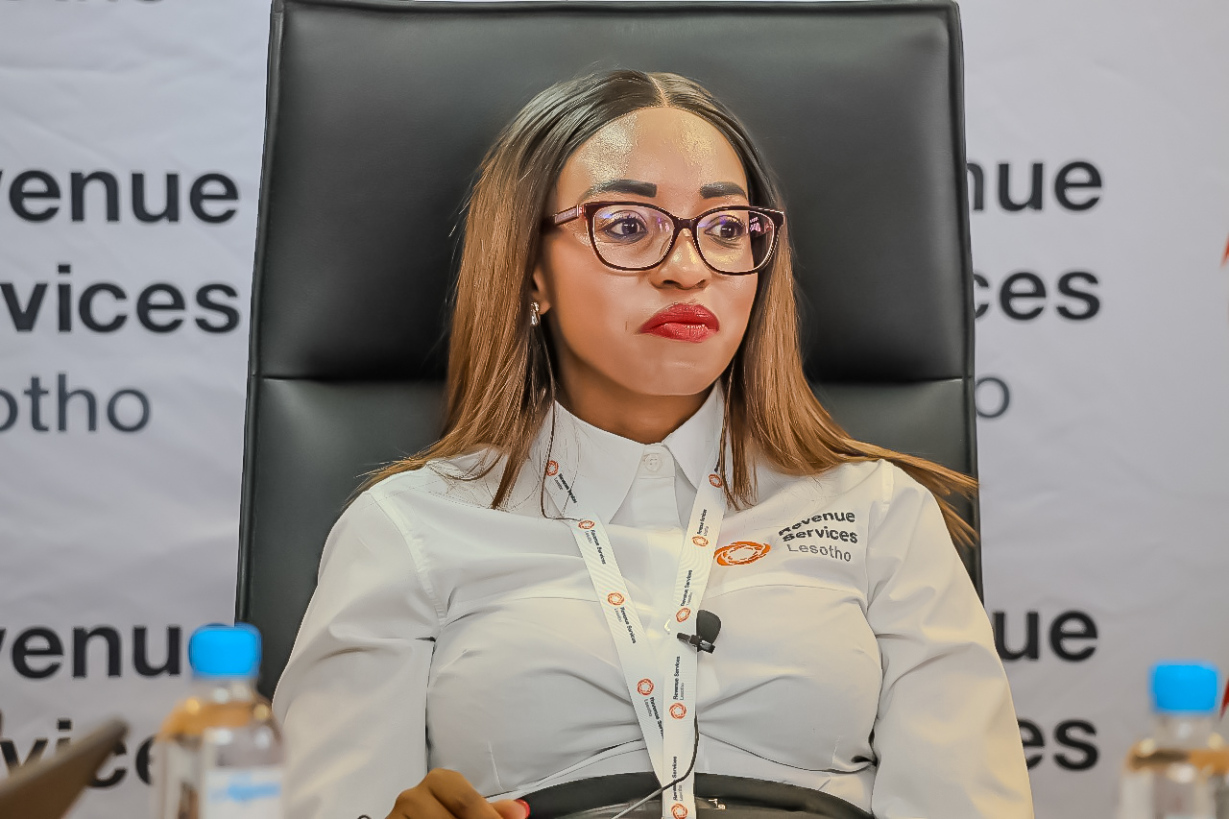…surpassing target by 3%
Moroke Sekoboto
THE Revenue Services Lesotho (RSL) has remitted M9.74 billion to the government in tax collections for the 2024/35 fiscal year.
This represents a positive variance of M261.19 million (3%) from the M9.48 billion set as the target by the government at the beginning of the financial year, which ended on Monday.
RSL Commissioner General, Advocate Mathabo Mokoko, took pride in the achievement, stating that it represented an 11% increase compared to last year’s collection of M8.86 billion, demonstrating proportional improvement in tax collection.
Adv Mokoko explained that the overall tax collection included Income Tax, Value Added Tax (VAT), Tobacco & Alcohol Products Levy, and the Gaming Levy. Customs duties were excluded, as these form part of the Southern African Customs Union (SACU) pool.
Adv Mokoko provided a breakdown of the individual tax categories.
The Income Tax annual target was M4.93 billion, but actual remittances stood at M5.25 billion, exceeding the target by M325.89 million (6.6%).
Income Tax collections were derived from Personal Income Tax, Corporate Income Tax, Withholding Tax, and Fringe Benefits Tax.
The annual VAT target was M4.35 billion, but remittances stood at M4.30 billion, falling short by M49.64 million (1.1%).
The Tobacco & Alcohol Products Levy had a target of M168.45 million, but collections reached M160.80 million, missing the target by M7.65 million (4.5%).
The Gaming Levy had a target of M7.13 million, but actual remittances stood at M16.40 million, surpassing the target by M9.27 million (130%).
“In terms of revenue contributions, Income Tax accounted for 54%, VAT contributed 44%, while the Tobacco & Alcohol Products Levy and Gaming Levy contributed 2% of the total revenue,” Adv Mokoko said.
“RSL processed refunds totaling M1.05 billion, with VAT refunds amounting to M914.60 million and Income Tax refunds standing at M134.34 million, which represents a highest percentage increase of 25%.”
Despite the positive trends in taxpayer compliance, Advocate Adv Mokoko expressed concern about tax evasion, under-declaration of income, and non-adherence to payment arrangements.
She pointed out that some taxpayers, after making debt payment arrangements, failed to honour them, while others lodged continuous appeals in an attempt to delay tax payments.
“The taxes evaded and taxes not paid deny the government the ability to build much-needed infrastructure, provide medicines in hospitals, offer better pensions for the elderly, send students to universities, and create jobs for the youth, among other things,” Adv Mokoko said.
Adv Mokoko also acknowledged ongoing economic challenges. She said global economic growth remained stagnant, with the IMF projecting a GDP growth of 3.3% in 2025 and 2026, up slightly from 3.2% in 2024, but still below the pre-pandemic average of 3.7%.
Regionally, Sub-Saharan Africa is expected to grow at 4.2% in 2025 and 2026, up from 3.8% in 2024. South Africa’s GDP is forecasted to grow at 1.5% in 2025 and 1.6% in 2026, compared to 0.8% in 2024.
Lesotho’s economy remains stable at a 2.5% growth rate, though with decreasing momentum, according to the Government of Lesotho’s 2025 forecast.
She also said the impact of inflation had diminished purchasing power, shifting consumer spending to lower-taxed goods and services. This change, combined with a 3% decline in taxable imports and a similar increase in non-taxable imports, has negatively affected VAT collections.
“Despite these challenges—global, regional, and domestic economic shocks—the tax-to-GDP ratio increased from 22.5% to 23.5%, with an annual remittance growth of 10%. This largely reflects the efforts of the RSL to achieve this outcome.”
She said the collection growth was recorded in several sectors, with the top-performing industries being Art, Entertainment, and Recreation (527.1%), Activities of Extraterritorial Organizations and Bodies (51.5%), Education (28.9%), Information (22.5%), and Water Supply (18.8%).
Adv Mokoko expressed optimism about the potential impact of pending tax bills in Parliament, stating that once enacted, they would enhance revenue collection and support RSL’s efforts to modernise its tax administration.
“We remain hopeful that these Bills will be legislated soon. They will enhance revenue collection and further enable our capability to modernize our tax administration. These laws are essential to fostering growth and strengthening domestic revenue mobilisation efforts,” she said.
However, she cautioned that the way forward may be difficult, given the declining SACU receipts and the changing dynamics of foreign aid, particularly from the United States which has since withdrawn funding to several organisations.
“The road ahead looks bumpy and edgy, given the declining SACU receipts and the posture taken by the United States government on foreign aid, as we all know the US is or used to be a major contributor to foreign aid.”
She also said domestic resource mobilisation was no longer optional but a critical necessity.
“We must significantly reduce dependence on foreign aid, loans, and donations, which are often tied to external conditions. While external assistance may still play a role, the future of Lesotho’s development lies in her ability to generate and mobilize domestic resources for her own progress.”


2 comments
Discover detailed information about the Audemars Piguet Royal Oak Offshore 15710ST here including price trends ranging from 34566 to 36200 for stainless steel models. The 42mm timepiece showcases a robust design with mechanical precision and water resistance crafted in rose gold . Original Audemars Piguet Royal Oak Offshore Diver 15710 st review Check secondary market data where limited editions command premiums alongside pre-owned listings from the 1970s. Request real-time updates on availability specifications and investment returns with price comparisons for informed decisions.
Наш ресурс предлагает свежие новостные материалы со всего мира. Здесь представлены события из жизни бизнесе и других областях. Материалы выходят регулярно что позволяет всегда быть в курсе. Удобная структура помогает быстро ориентироваться. https://malemoda.ru Каждое сообщение предлагаются с фактчеком. Мы стремимся к достоверности. Читайте нас регулярно чтобы быть в курсе самых главных событий.